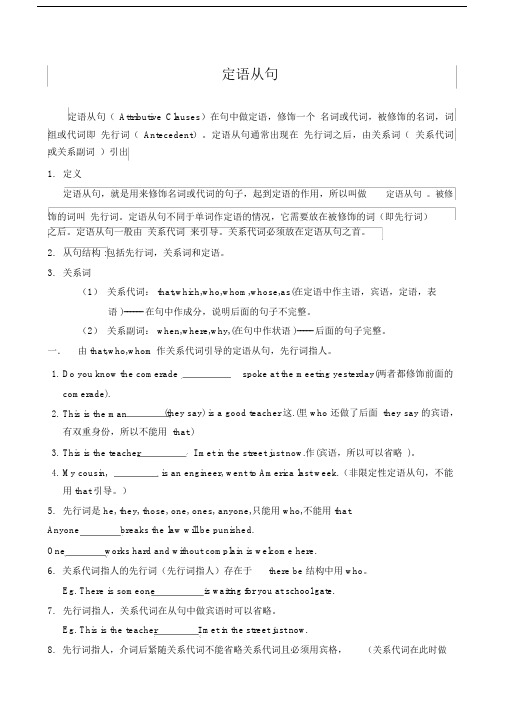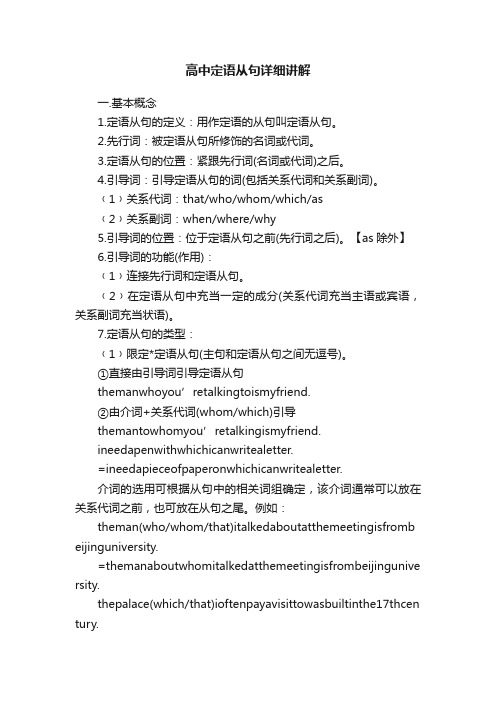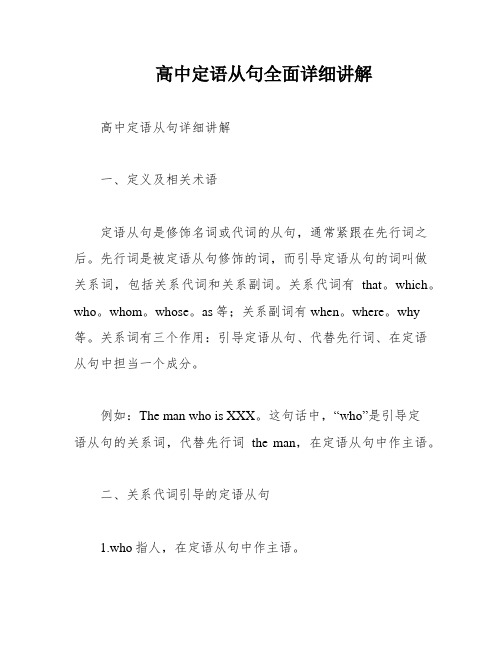高中定语从句详细讲解
高中定语从句完整讲解.docx

定语从句定语从句(Attributive Clauses)在句中做定语,修饰一个名词或代词,被修饰的名词,词组或代词即先行词(Antecedent)。
定语从句通常出现在先行词之后,由关系词(关系代词或关系副词)引出1.定义定语从句,就是用来修饰名词或代词的句子,起到定语的作用,所以叫做定语从句。
被修饰的词叫先行词。
定语从句不同于单词作定语的情况,它需要放在被修饰的词(即先行词)之后。
定语从句一般由关系代词来引导。
关系代词必须放在定语从句之首。
2.从句结构 :包括先行词,关系词和定语。
3.关系词(1)关系代词: that,which,who,whom,whose,as(在定语中作主语,宾语,定语,表语 )------ 在句中作成分,说明后面的句子不完整。
(2)关系副词: when,where,why,(在句中作状语 )----- 后面的句子完整。
一.由 that,who,whom 作关系代词引导的定语从句,先行词指人。
1.Do you know the comerade spoke at the meeting yesterday(两者都修饰前面的comerade).2.This is the man(they say) is a good teacher这.(里 who 还做了后面 they say 的宾语,有双重身份,所以不能用 that.)3.This is the teacher I met in the street just now.作(宾语,所以可以省略 )。
4.My cousin,is an engineer, went to America last week.(非限定性定语从句,不能用 that 引导。
)5.先行词是 he, they, those, one, ones, anyone,只能用 who,不能用 that.Anyone breaks the law will be punished.One works hard and without complain is welcome here.6.关系代词指人的先行词(先行词指人)存在于there be 结构中用 who。
完整)高中定语从句详细讲解

完整)高中定语从句详细讲解高中定语从句详细讲解定语从句是修饰某一名词或代词的从句,一般紧跟在它所修饰的先行词之后。
被定语从句修饰的词叫先行词,而引导定语从句的词叫关系词,包括关系代词和关系副词。
关系代词有that。
which。
who。
whom。
whose。
as等;关系副词有when。
where。
why等。
关系词通常有三个作用:引导定语从句、代替先行词、在定语从句中担当一个成分。
例如,句子“The man who is XXX.”中,“who”是引导定语从句的关系代词,代替先行词the man,在定语从句中作主语。
因此,定语从句的作用是修饰先行词the man,进一步说明他是一位警察。
关系代词中,who指人,在定语从句中作主语。
例如,“XXX Class One.”表示正在踢足球的男孩是一班的。
whom指人,在定语从句中做宾语,常可省略。
例如,“Mr Liu is theperson ( whom ) you talked about on the bus.”表示XXX就是你们在公共汽车上谈论的那个人。
总之,定语从句是英语语法中的重要部分,掌握好定语从句的用法和关系词的选择,对于提高英语语言水平和应试能力都有很大的帮助。
The professor you were waiting for has arrived。
The girl who is often praised by the teacher is our class monitor.The man you just met is my old friend.XXX is a sport that most boys like。
The computer XXX.XXX。
The house by the XXX.This is the pen he XXX。
The movie they watched last night was not XXX.The number of people who visit this city each year reaches one n.Where is the man I saw this morning?The XXX me to is very kind.Summer is the season that comes after spring.XXX。
高中定语从句详细讲解

高中定语从句详细讲解一.基本概念1.定语从句的定义:用作定语的从句叫定语从句。
2.先行词:被定语从句所修饰的名词或代词。
3.定语从句的位置:紧跟先行词(名词或代词)之后。
4.引导词:引导定语从句的词(包括关系代词和关系副词)。
﹙1﹚关系代词:that/who/whom/which/as﹙2﹚关系副词:when/where/why5.引导词的位置:位于定语从句之前(先行词之后)。
【as除外】6.引导词的功能(作用):﹙1﹚连接先行词和定语从句。
﹙2﹚在定语从句中充当一定的成分(关系代词充当主语或宾语,关系副词充当状语)。
7.定语从句的类型:﹙1﹚限定*定语从句(主句和定语从句之间无逗号)。
①直接由引导词引导定语从句themanwhoyou’retalkingtoismyfriend.②由介词+关系代词(whom/which)引导themantowhomyou’retalkingismyfriend.ineedapenwithwhichicanwritealetter.=ineedapieceofpaperonwhichicanwritealetter.介词的选用可根据从句中的相关词组确定,该介词通常可以放在关系代词之前,也可放在从句之尾。
例如:theman(who/whom/that)italkedaboutatthemeetingisfromb eijinguniversity.=themanaboutwhomitalkedatthemeetingisfrombeijingunive rsity.thepalace(which/that)ioftenpayavisittowasbuiltinthe17thcen tury.=thepalacetowhichioftenpayavisitwasbuiltinthe17thcentury.﹙2﹚非限定*定语从句(主句和定语从句之间用逗号隔开)。
①直接由引导词引导定语从句。
高中定语从句全面详细讲解

高中定语从句全面详细讲解高中定语从句详细讲解一、定义及相关术语定语从句是修饰名词或代词的从句,通常紧跟在先行词之后。
先行词是被定语从句修饰的词,而引导定语从句的词叫做关系词,包括关系代词和关系副词。
关系代词有that。
which。
who。
whom。
whose。
as等;关系副词有when。
where。
why 等。
关系词有三个作用:引导定语从句、代替先行词、在定语从句中担当一个成分。
例如:The man who is XXX。
这句话中,“who”是引导定语从句的关系词,代替先行词the man,在定语从句中作主语。
二、关系代词引导的定语从句1.who指人,在定语从句中作主语。
例如:XXX are from Class One。
正在踢足球的男孩是一班的。
Those who want to go to the museum must be at the school gate at 7 XXX。
想去博物馆的人必须在明晨7点到大门口集合。
XXX I helped an old man who had lost his way。
昨天我帮助了一位迷路的老人。
That is the XXX。
那就是教我们物理的老师。
2.whom指人,在定语从句中做宾语,常可省略。
例如:Mr。
Liu is the person (whom) you talked about on the bus。
XXX就是你们在公共汽车上谈论的那个人。
Li Ming is just the boy (whom) I want to see。
XXX正是我想要见的男孩。
The professor (whom) you are waiting for has come。
你正在等的教授已经来了。
The girl who is often praised by the teacher is our monitor。
She is a responsible and diligent student who always sets a good example for the rest of the class.The man you just met is my old friend。
高中英语定语从句详解(绝对经典课件)

30
why
• why可用for +which 代替
1.This is the reason. 2.I was late for school for this reason which . This is the reason for which I was why late for school.
The Attributive Clause
(Attributive clause)
一、概念: 在复合句中修饰名词或代词的句子. (在句子中作定语)
Harry Porter is a smart boy.
形容词作定语
Harry Porter is a boy who has magic power.
I know the girl whose mother is a teacher.
分解
I know the girl.
作定语
The girl’s mother is a teacher.
I have a book whose cover is yellow.
2. which, that 的用法
which 作定语从句的主语或宾语.
(一)引导定语从句的关系代词
主语
hat
指物
whom(优先) whose (of whom) who that Which Whose that (of which)
指人和物
that
that
whose
巩固练习:2. 用适当的关系词填空 who/that 1.The girl __________is standing next to our teacher is her daughter. (who/whom/that) 2. The girl _________________our teacher is talking with is a famous singer. whose mother is a teacher can speak 3. The girl________ English very well. which/that 4. I can’t find the book ____________is borrowed from the library. (that/which) 5. I can’t find the book ________________you lent to me.
高中定语从句详细讲解

高中定语从句详细讲解一、什么是定语从句?定语从句是修饰名词或代词的从句,用来对名词或代词进行进一步的说明或限制。
它通常由关系代词或关系副词引导。
二、关系代词引导的定语从句1. 引导关系代词有:that, which, who, whom, whose, as, when, where等。
例句1:The book that I borrowed from the library is very interesting.这本书是我从图书馆借来的,非常有趣。
例句2:The girl who is sitting next to me is my best friend.坐在我旁边的那个女孩是我最好的朋友。
例句3:I don't know the reason why he didn't come to the party.我不知道他为什么没来参加派对的原因。
三、关系副词引导的定语从句1. 引导关系副词有:when, where, why, how等。
例句4:This is the school where I studied last year.这是我去年学习的学校。
例句5:I will never forget the day when we met for the first time.我永远不会忘记我们第一次见面的那一天。
四、关系代词和关系副词的用法区别1. 关系代词在定语从句中充当主语或宾语,而关系副词则在定语从句中充当状语。
例句6:The girl who/that is standing there is my sister.(关系代词作主语)站在那里的那个女孩是我的妹妹。
例句7:I still remember the day when/that we went on a trip together.(关系副词作状语)我仍然记得我们一起去旅行的那一天。
五、关系代词的省略1. 当定语从句的关系代词在从句中作宾语,并且在主句中有明确的宾语时,可以省略关系代词。
(word完整版)高中定语从句全面详细讲解
高中定语从句详细讲解一: 定义及相关术语1.定语从句:修饰某一名词或代词的从句叫定语从句。
定语从句一般紧跟在它所修饰的先行词之后。
2.先行词:被定语从句修饰的词叫先行词。
3.关系词:引导定语从句的词叫关系词。
关系词有关系代词和关系副词。
关系代词有that, which, who, whom, whose, as等;关系副词有when, where, why等。
关系词通常有以下三个作用: A 、引导定语从句;B、代替先行词;C、在定语从句中担当一个成分。
例如: The man who is shaking hands with my father is a policeman.该句中,who is shaking hands with my father 是定语从句,修饰先行词 the man ,“ who〞是引导定语从句的关系词,代替先行词 the man ,在定语从句中作主语。
二:限制性定语从句和非限制性定语从句限制性定语从句形式上:不用逗号“,〞与主句隔开。
意义上:是先行词不可缺少的定语,如删除,主句那么失去意义或意思表达不完整。
译法上:译成先行词的定语:“...的〞关系词的使用上: A .作宾语时可省略 B .可用 that C .可用 who 代替 whom非限制性定语从句形式上:用逗号“,〞与主句隔开。
意义上:只是对先行词的补充说明,如删除,主句仍能表达完整的意思。
译法上:通常译成主句的并列句。
关系词的使用上: A .不可省略 B .不用 that C.不可用who 代替 whom限制性定语从句举例:The teacher told me that Tom was the only person that I could depend on.老师告诉我说汤姆是我唯一的可以依靠的人。
非限制性定语从句举例:His mother, who loves him very much, is strict with him.他妈妈十分地爱他,对他要求很严格。
高中英语语法定语从句总结全
高中英语定语从句详解Ⅰ.概念:(1) 定语从句: 在主从复合句中用作定语的从句叫定语从句。
定语从句一般紧接在先行词()后面。
(2) 先行词:被定语从句修饰的成份。
先行词可以为一个词, 短语, 或整个主句。
(3) 引导定语从句的词叫关系词, 分为关系代词和关系副词。
关系词的作用:1) 引导定语从句, 连接主句和从句, 相当于一个连词;2) 必在从句中作某个句子成份(可以做主语, 宾语, 表语, 定语, 状语)常用的关系代词: 、、、、,当关系代词在定语从句中做宾语时, 关系代词可以省略。
常用的关系副词(在从句中只作状语): (时间状语)、(原因状语)、(地点状语)可以修饰人的关系代词: , , ,可以修饰事的关系代词: , , , ,.I .() .I'd a .定语从句三步:第一找出先行词;第二看先行词在定语从句中的语法功能(做主语、宾语、表语或状语);第三选择合适的关系词。
Ⅱ.几个关系代词的基本用法:●: 可指人或物;在定语从句中作主语, 宾语, 表语。
(指人时, 相当于或;指物时, 相当于)(一般不用于非限制性定语从句; 不可置于介词后作宾语) 如:1.A .(主语)2.3. ( ) .(宾语)4. ()5. ( ) .6.'s ( ) .(表语)7. () .(= .= 。
= .)●: 指物;在定语从句中作主语, 宾语。
如:1. .(主语)2. () I .(宾语)●, , :: 主格, 在从句中作主语, 只可指人: 宾格, 在从句中只能作宾语; 只可指人: 表所属关系, 在从句中作定语。
译为: 某人的, 某物的+ 名词 + n.+ (某物的)+ n.+ (某人的)I .(主语)( / ) .I a .( = )A .(指人)( = )I'd a .(指物)( )关系代词作介词宾语 (在定语从句中, 介词提前时, 介词后: 表人用;表物用 )关系代词在定语从句中用作介词宾语时, 介词可放于从句之首, 也可放于从句之末.但以放于句首较为正式.(介词前置,必须注意不影响动词词组的含义。
高中定语从句详细讲解
高中定语从句详细讲解定语从句是修饰一个名词或代词的从句,用于对被修饰词进行进一步的说明或限制。
在高中英语中,定语从句是一个重要的语法知识点。
下面列举了一些关于高中定语从句的详细讲解。
1. 定语从句的概念和作用:定语从句是对名词或代词进行进一步的说明或限制。
它可以修饰名词的前面、后面或中间位置,起到补充、限定或说明的作用。
2. 定语从句的引导词:引导定语从句的词有关系代词和关系副词两种。
关系代词有which、who、whom、whose和that;关系副词有when、where和why。
3. 定语从句的位置:定语从句可以放在被修饰词的前面、后面或中间位置。
当定语从句放在被修饰词的前面时,需要用逗号将定语从句和主句隔开。
4. 关系代词的选择:关系代词的选择要根据其在定语从句中的成分来确定。
例如,which和that可以用来修饰物,who和that可以用来修饰人,whom可以用来修饰人作宾语,whose可以用来修饰人或物的所有格。
5. 关系副词的选择:关系副词when用来引导修饰时间的定语从句,where用来引导修饰地点的定语从句,why用来引导修饰原因的定语从句。
6. 定语从句的省略:当定语从句中的主语和主句的主语一致时,可以将定语从句中的主语和be动词省略掉。
例如,The girl who is sitting next to me is my sister可以省略为The girl sitting next to me is my sister。
7. 定语从句的种类:定语从句可以分为限制性定语从句和非限制性定语从句。
限制性定语从句是对被修饰词进行限制和说明,如果去掉定语从句,句子的意思就不完整。
非限制性定语从句是对被修饰词进行补充和解释,如果去掉定语从句,句子的意思仍然完整。
8. 限制性定语从句的特点:限制性定语从句通常不用逗号和引号隔开,修饰的内容与主句有密切的联系,不能随意省略。
9. 非限制性定语从句的特点:非限制性定语从句通常用逗号和引号隔开,修饰的内容与主句有较强的联系,可以随意省略。
高考英语 定语从句知识点归纳讲解(课件)
试卷讲评课件
▲ as通常以the same … as或such … as的形式引导定语从句,as在定 语从句中作主语、宾语或表语等。 as和which引导非限制性定语从句中都能指代整句内容,which译为“这”, as 译为“正如”。但定语从句位于句首时只能用as。As we all know,…/As is known to all,…(正如大家所知道….)
二、定语从句的关系词用法
试卷讲评课件
(一)关系代词:who、whom、which、that、whose、as
关系代词 who whom whose which that as
先行词 人 人
人/物 物
人/物 人/物
在从句中充当的成分 主语、宾语、表语
宾语 定语 主语、宾语 主语、宾语、表语 主语、宾语、表语
三、非限制性定语从句
试卷讲评课件
非限定性定语从句,从句式上看,有逗号隔开。它既可以修饰先行词, 也可修饰整个句子。它对其先行词没有限定、修饰的作用,只起补充、 说明的作用。 1.非限制性定语从句通常不能用that 2. 非限制性定语从句不能用why引导,要用for which代替why。例如: I had told them the reason,for which I didn't attend the meeting. 3. 非限制性定语从句置于句首时,不能用which引导。关系代词as引导 非限制性定语从句位置比较灵活,可以放主句前,也可以放主句后。
Tranquil/ˈtræŋkwəl/
试卷讲评课件
Li Shangyin(李商隐) 1.Li Shangyin was a Chinese poet of the late Tang Dynasty and born in Henei. 2.Li Shangyin was a typical late Tang poet. His works are sensuous, dense and allusive. 3.His most famous and cryptic poem is called Jin Se. sensuous/ˈsenʃuəs/ , dense/dens/ and allusive/əˈluːʒən/ .敏感、晦涩、含 沙射影。 Shangguan Wan'er(上官婉儿) 1. Shangguan Wan'er was a talented woman in Tang dynasty.
- 1、下载文档前请自行甄别文档内容的完整性,平台不提供额外的编辑、内容补充、找答案等附加服务。
- 2、"仅部分预览"的文档,不可在线预览部分如存在完整性等问题,可反馈申请退款(可完整预览的文档不适用该条件!)。
- 3、如文档侵犯您的权益,请联系客服反馈,我们会尽快为您处理(人工客服工作时间:9:00-18:30)。
高中定语从句详细讲解(一)定义及相关术语1 •定语从句:修饰某一名词或代词的从句叫定语从句。
定语从句一般紧跟在它所修饰的先行词之后。
2 •先行词:被定语从句修饰的词叫先行词。
3 •关系词:引导定语从句的词叫关系词。
关系词有关系代词和关系副词。
关系代词有that, which, who, whom, whose, as 等;关系畐y词有when, where, why 等。
关系词通常有下列三个作用:A、引导定语从句;B、代替先行词;C、在定语从句中担当一个成分。
例如:The man who is shak ing hands with my father is a policema n. 该句中,who is shak ing hands with my father是定语从句,修饰先行词the man , “ who ”是引导定语从句的关系词,代替先行词the man,在定语从句中作主语。
(二)关系代词引导的定语从句1 • who 指人,在定语从句中作主语。
The boys who are playi ng football are from Class On e. 正在踢足球的男孩是一班的。
Those who want to go to the museum must be at the school gate at 7 tomorrow morni ng. 想去博物馆的人必须在明晨7点到大门口集合。
Yesterday I helped an old man who had lost his way. 昨天我帮助了一位迷路的老人。
That is the teacher who teaches us physics. 那就是教我们物理的老师。
2 • whom 指人,在定语从句中做宾语,常可省略。
Mr Liu is the person ( whom ) you talked about on the bus. 刘先生就是你们在公共汽车上谈论的那个人。
Li Mi ng is just the boy ( whom ) I want to see. 李明正是我想要见的男孩。
The professor ( whom ) you are wait ing for has come. The girl ( whom ) the teacher ofte n praises is our mon itor. 的班长。
注意:关系代词whom在口语或非正式文体中常可用你正在等的教授已经来了。
老师经常表扬的那个女孩是我们who来代替,也可省略。
The man ( whom / who )you met just now is my old friend.3 • Which指物,在定语从句中做主语或宾语,做宾语时常可省略。
Football is a game which is liked by most boys. 足球是大多数男孩所喜欢的运动。
The factory which makes computers is far away from here. 制造计算机的那家公司离这儿很远。
He likes to read books which are writte n by foreig n writers. 他喜欢外国作家写的书。
The house which is by the lake looks nice. 湖边的那幢房子看上去很漂亮。
This is the pen ( which ) he bought yesterday. 这是他昨天买的钢笔。
The film ( which ) they went to see last night was not interesting at all. 他们昨晚看的电影一点意思也没有。
4 • That指人时,相当于who或whom ;指物时,相当于which.。
在定语从句中作主语或宾语,作宾语时常可省略。
The nu mber of people that / who come to visit this city each year reaches one milli on. 每年来参观这座城市的人数达一百万。
Where is the man that / whom I saw this morni ng? 我今天早上看到的那个人在哪儿?The person that /whom you in troduced to me is very kind. 你介绍给我的那个人很友好。
The seas on that / which comes after spri ng is summer. 春天以后的季节是夏季。
Yesterday I received a letter that / which came from Australia. 昨天我收至到了一圭寸来自澳大禾U 亚的信。
5. Whose 通常指人,也可指物,在定语从句中做定语。
I visited a scie ntist whose n ame is known all over the country. 我拜访了一个全国知名的科学家。
He has a friend whose father is a doctor. 他有一个爸爸当医生的朋友。
I once lived in the house whose roof has fallen in. 我曾经住在那幢屋顶已经倒塌了的房子里。
注意:指物时,常用下列结构来代替:The classroom whose door is broke n will soon be repaired.The classroom the door of which is broke n will soon be repaired.Do you like the book whose cover is yellow?Do you like the book the cover of which is yellow?(三)“介词+关系代词”引导的定语从句关系代词在定语从句中作介词宾语时,从句常常由“介词+关系代词”引出。
The school (which / that) he once studied in is very famous.The school in which he once studied is very famous. 他曾经就读过的学校很出名。
Tomorrow I ' ll bring here the magazine (which / that) you asked for.Tomorrow I ' ll bring here the magazine for which you asked.明天我将把你要的杂志带来。
This is the boy (whom / who / that) I played tennis with yesterday.This is the boy with whom I played tennis with yesterday. 这是我昨天跟他打台球的男孩。
We' ll go to hear the famous sin ger (whom / who / that) we have ofte n talked about.We' II go to hear the famous sin ger about whom we have ofte n talked. 我们将去听那位我们经常谈论的著名歌唱家演唱。
The manager whose company I work in pays much attention to improving our working con diti ons. The manager in whose company I work pays much attention to improving our working con diti ons.我工作的那家公司的经理十分注意改善我们的工作条件。
注意:1.含有介词的短语动词一般不拆开,介词仍放在短语动词的后面。
女如: look for, lookafter, take care of 等。
This is the watch (which / that) I am looki ng for. (正)这是我正在找的手表。
This is the watch for which I am look ing . (误)The babies (whom / who / that) the nurse is look ing after are very healthy. (正)那个保姆照看的小宝宝们都很健康。
The babies after whom the nurse is look ing are very healthy. (误)2 .若介词放在关系代词前,关系代词指人时只可用whom,不可用who, that ;关系代词指物时只可用which,不可用that。
关系代词是所有格时用whose。
The man with whom you talked just now is my n eighbour. (正)你刚才跟他谈话的那个人是我的邻居。
The man with that / who you talked just now is my n eighbour.The pla ne in which we flew to Ca nada was really comfortable.(正)我们去加拿大所乘坐的 飞机实在很舒服。
The pla ne in that we flew to Can ada was really comfortable.(误)3."介词 + 关系代词”前还可有 some, any, none, all, both, n either,many, most, each, few 等代词或者数词。
如:He loves his parents deeply, both of whom are very kind to him.他深深地爱着他的父母,他们俩待他都很好。
In the basket there are quite many apples, some of which have gone bad. 果,有些已经坏了。
There are forty stude nts in our class in all, most of whom are from big cities. 有40个学生,大多数来自大城市。
